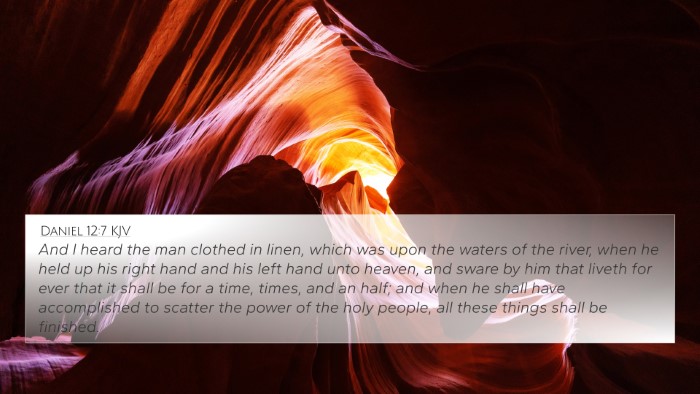Understanding Daniel 11:13
Daniel 11:13 reads: "For the king of the north will return and muster a greater army than before." This verse is part of a prophetic account detailing the conflicts between the kings of the north and south, symbolizing larger historical and spiritual truths.
Contextual Overview
In the broader narrative of the Book of Daniel, particularly in Chapter 11, we see a delineation of events concerning the kingdoms that arose after the fall of Alexander the Great. This chapter highlights the intricate power struggles, military confrontations, and the spiritual implications of these earthly conflicts.
Commentary Insights
- Matthew Henry: He notes that this verse exemplifies the continual strife between these two kingdoms. Henry emphasizes the cyclical nature of conflict and the relationship between earthly powers and divine providence.
- Albert Barnes: Barnes points out the prophetic nature of the text, linking this king of the north to historical leaders and their military campaigns. He stresses the importance of understanding these symbols in the context of God’s overarching plan.
- Adam Clarke: Clarke asserts that this verse illustrates the historical interactions between rival kingdoms. He emphasizes the significance of these events in teaching lessons of faith and reliance on God amid turmoil.
Thematic Connections
This verse can be linked to several key themes within the Bible:
- Divine Sovereignty: It reflects God's control over historical events and kingship.
- The Nature of Conflict: It exemplifies the eternal struggle between good and evil, both spiritually and politically.
- Endurance of the Faithful: It highlights the challenges the faithful endure amid earthly powers.
Cross-Referencing and Links
Understanding how Daniel 11:13 relates to other scripture is crucial for a thematic Bible verse connection. Here are some relevant Bible verses:
- Jeremiah 46:6: "Let not the swift flee away, nor the mighty man escape." This verse reflects the futility of human efforts against divine will.
- Revelation 13:7: "It was given to him to make war with the saints and to overcome them." This links to the broader theme of conflict between earthly rulers and God's people.
- Daniel 8:20-22: Discusses the emergence of kingdoms and their eventual fall, providing context for the struggle mentioned in Daniel 11.
- Isaiah 41:25: "I have raised up one from the north, and he shall come." This prophecy of a northern ruler connects directly with the king mentioned in Daniel 11.
- Luke 21:9: "And when you hear of wars and commotions, do not be terrified." Echoes the ongoing nature of military conflicts and the need for faith.
- Matthew 24:6: "You will hear of wars and rumors of wars, but see that you are not troubled." The New Testament perspective on conflict aligns with Daniel's prophecy.
- Psalm 46:10: "Be still, and know that I am God!" Offers assurance amidst international and personal turmoil.
- 1 John 4:4: "He who is in you is greater than he who is in the world." This encourages believers that God's presence surpasses earthly powers.
- Revelation 19:11-16: The victory of Christ in the end times assures believers of God's supreme authority over the kingdoms of the earth.
- Romans 13:1: "Let every soul be subject to the governing authorities." Advises obedience to earthly powers while recognizing God's sovereignty.
Conclusion
Daniel 11:13 represents more than historical commentary; it serves as an essential part of the biblical narrative that encourages believers to trust in God's sovereignty amid conflicts. By examining biblical cross-references and themes, we recognize the interconnectedness of Scriptures, enhancing our understanding of God's word.
Tools for Bible Cross-Referencing
For further study, consider utilizing tools for Bible cross-referencing:
- Bible Concordance
- Bible Cross-Reference Guide
- Comprehensive Bible Cross-Reference Materials
- Cross-reference Bible Study Methods
- How to Use Bible Cross-References
Exploring Cross-Referenced Themes
The connections between texts enhance our biblical understanding, guiding believers in their spiritual journeys and studies. Engaging in a comparative study of Pauline Epistles to Old Testament prophecies can yield profound insights into God's unchanging nature.





